Situation of Ebola Survivors in West Africa: A Detailed Analysis
VerifiedAdded on 2023/06/07
|6
|1364
|219
Report
AI Summary
This report examines the challenges faced by Ebola survivors in West Africa following the 2013-2016 epidemic, including social, economic, and health-related issues, stigma, and discrimination. It discusses the causes of explicit and implicit biases against survivors, such as fear of contagion, lack of communication, and distrust in international health responses. The report highlights the roles of the media, government, and NGOs in addressing these biases through information dissemination, policy implementation, and psychosocial support. It also explores efforts to reduce biases, including community reintegration programs and awareness campaigns. A cultural comparison between Liberia and the United States reveals differences in literacy levels and attitudes towards Ebola survivors. The report concludes by emphasizing the need for continued health education and support for survivors to combat stigma and discrimination. Desklib offers similar solved assignments and past papers for students.
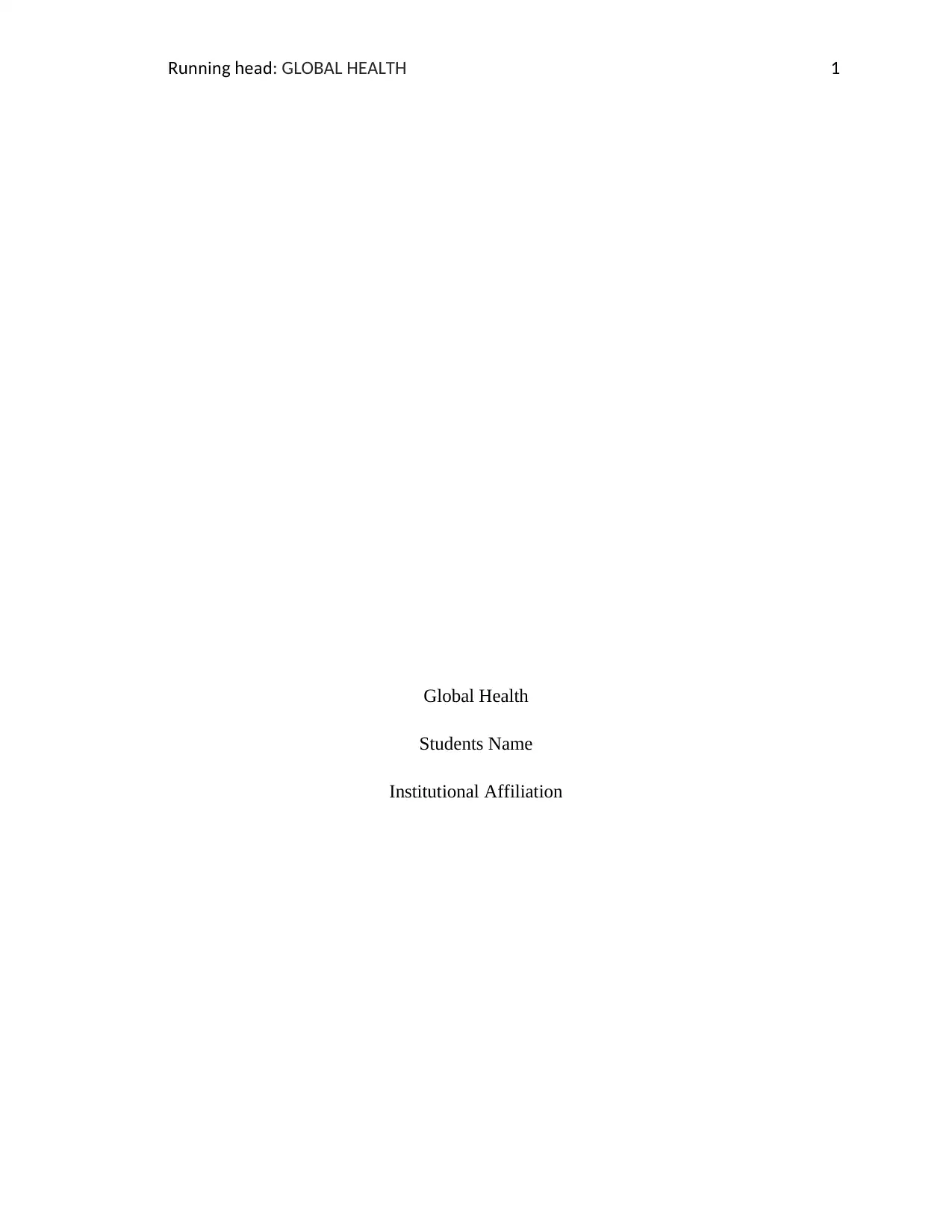
nnin eadRu g h A A T: GLOB L HE L H 1
Global Health
Students Name
Institutional Affiliation
Global Health
Students Name
Institutional Affiliation
Paraphrase This Document
Need a fresh take? Get an instant paraphrase of this document with our AI Paraphraser
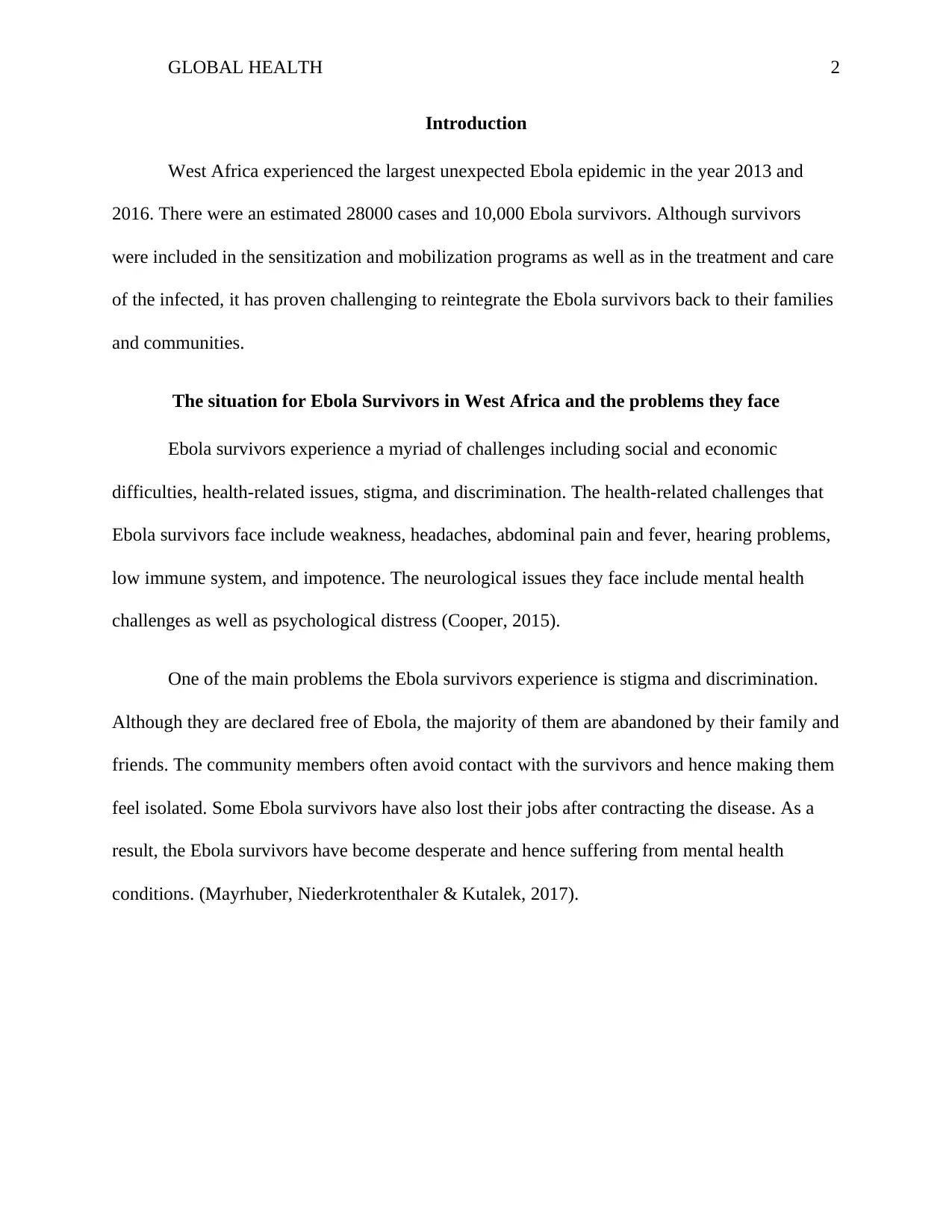
GLOBAL HEALTH 2
Introduction
West Africa experienced the largest unexpected Ebola epidemic in the year 2013 and
2016. There were an estimated 28000 cases and 10,000 Ebola survivors. Although survivors
were included in the sensitization and mobilization programs as well as in the treatment and care
of the infected, it has proven challenging to reintegrate the Ebola survivors back to their families
and communities.
The situation for Ebola Survivors in West Africa and the problems they face
Ebola survivors experience a myriad of challenges including social and economic
difficulties, health-related issues, stigma, and discrimination. The health-related challenges that
Ebola survivors face include weakness, headaches, abdominal pain and fever, hearing problems,
low immune system, and impotence. The neurological issues they face include mental health
challenges as well as psychological distress (Cooper, 2015).
One of the main problems the Ebola survivors experience is stigma and discrimination.
Although they are declared free of Ebola, the majority of them are abandoned by their family and
friends. The community members often avoid contact with the survivors and hence making them
feel isolated. Some Ebola survivors have also lost their jobs after contracting the disease. As a
result, the Ebola survivors have become desperate and hence suffering from mental health
conditions. (Mayrhuber, Niederkrotenthaler & Kutalek, 2017).
Introduction
West Africa experienced the largest unexpected Ebola epidemic in the year 2013 and
2016. There were an estimated 28000 cases and 10,000 Ebola survivors. Although survivors
were included in the sensitization and mobilization programs as well as in the treatment and care
of the infected, it has proven challenging to reintegrate the Ebola survivors back to their families
and communities.
The situation for Ebola Survivors in West Africa and the problems they face
Ebola survivors experience a myriad of challenges including social and economic
difficulties, health-related issues, stigma, and discrimination. The health-related challenges that
Ebola survivors face include weakness, headaches, abdominal pain and fever, hearing problems,
low immune system, and impotence. The neurological issues they face include mental health
challenges as well as psychological distress (Cooper, 2015).
One of the main problems the Ebola survivors experience is stigma and discrimination.
Although they are declared free of Ebola, the majority of them are abandoned by their family and
friends. The community members often avoid contact with the survivors and hence making them
feel isolated. Some Ebola survivors have also lost their jobs after contracting the disease. As a
result, the Ebola survivors have become desperate and hence suffering from mental health
conditions. (Mayrhuber, Niederkrotenthaler & Kutalek, 2017).
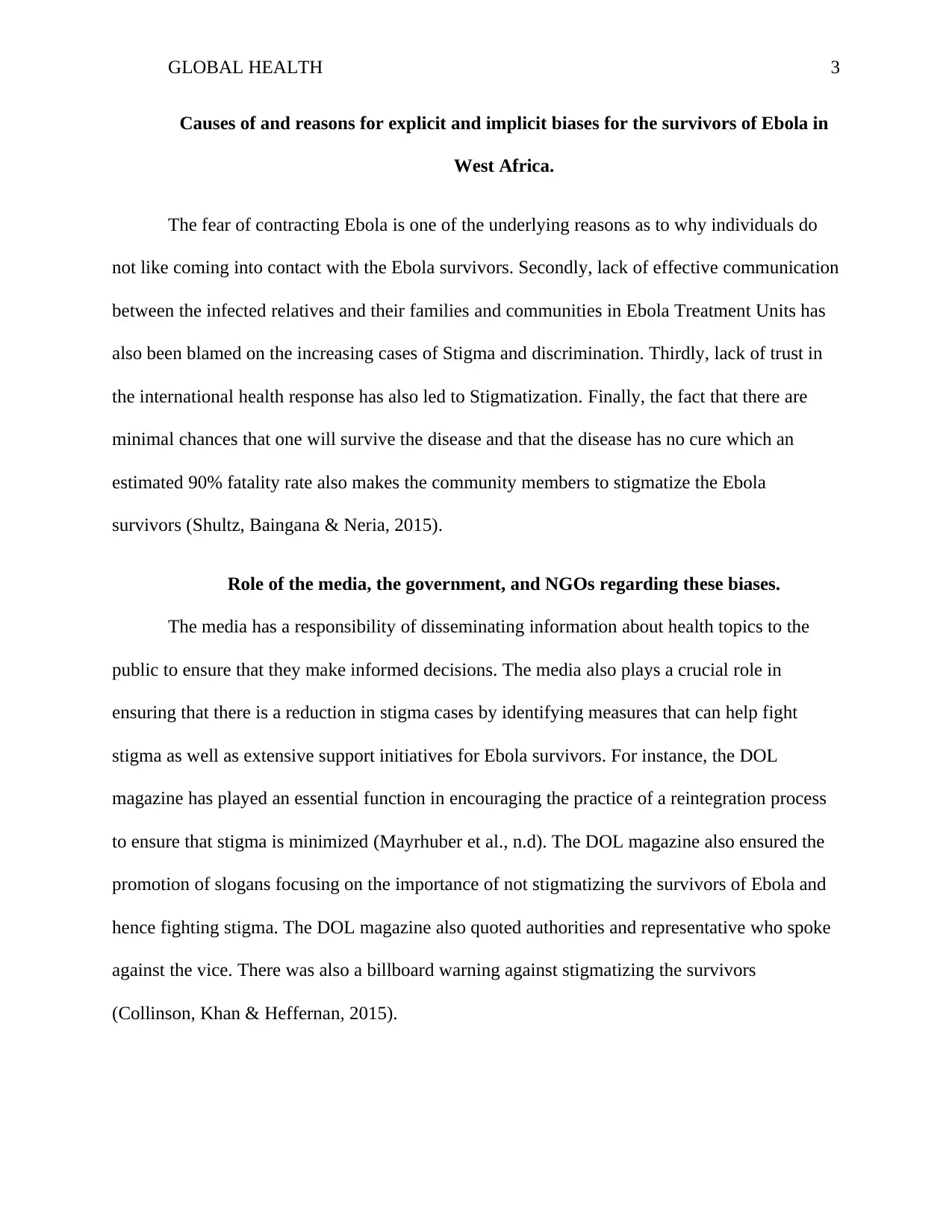
GLOBAL HEALTH 3
Causes of and reasons for explicit and implicit biases for the survivors of Ebola in
West Africa.
The fear of contracting Ebola is one of the underlying reasons as to why individuals do
not like coming into contact with the Ebola survivors. Secondly, lack of effective communication
between the infected relatives and their families and communities in Ebola Treatment Units has
also been blamed on the increasing cases of Stigma and discrimination. Thirdly, lack of trust in
the international health response has also led to Stigmatization. Finally, the fact that there are
minimal chances that one will survive the disease and that the disease has no cure which an
estimated 90% fatality rate also makes the community members to stigmatize the Ebola
survivors (Shultz, Baingana & Neria, 2015).
Role of the media, the government, and NGOs regarding these biases.
The media has a responsibility of disseminating information about health topics to the
public to ensure that they make informed decisions. The media also plays a crucial role in
ensuring that there is a reduction in stigma cases by identifying measures that can help fight
stigma as well as extensive support initiatives for Ebola survivors. For instance, the DOL
magazine has played an essential function in encouraging the practice of a reintegration process
to ensure that stigma is minimized (Mayrhuber et al., n.d). The DOL magazine also ensured the
promotion of slogans focusing on the importance of not stigmatizing the survivors of Ebola and
hence fighting stigma. The DOL magazine also quoted authorities and representative who spoke
against the vice. There was also a billboard warning against stigmatizing the survivors
(Collinson, Khan & Heffernan, 2015).
Causes of and reasons for explicit and implicit biases for the survivors of Ebola in
West Africa.
The fear of contracting Ebola is one of the underlying reasons as to why individuals do
not like coming into contact with the Ebola survivors. Secondly, lack of effective communication
between the infected relatives and their families and communities in Ebola Treatment Units has
also been blamed on the increasing cases of Stigma and discrimination. Thirdly, lack of trust in
the international health response has also led to Stigmatization. Finally, the fact that there are
minimal chances that one will survive the disease and that the disease has no cure which an
estimated 90% fatality rate also makes the community members to stigmatize the Ebola
survivors (Shultz, Baingana & Neria, 2015).
Role of the media, the government, and NGOs regarding these biases.
The media has a responsibility of disseminating information about health topics to the
public to ensure that they make informed decisions. The media also plays a crucial role in
ensuring that there is a reduction in stigma cases by identifying measures that can help fight
stigma as well as extensive support initiatives for Ebola survivors. For instance, the DOL
magazine has played an essential function in encouraging the practice of a reintegration process
to ensure that stigma is minimized (Mayrhuber et al., n.d). The DOL magazine also ensured the
promotion of slogans focusing on the importance of not stigmatizing the survivors of Ebola and
hence fighting stigma. The DOL magazine also quoted authorities and representative who spoke
against the vice. There was also a billboard warning against stigmatizing the survivors
(Collinson, Khan & Heffernan, 2015).
⊘ This is a preview!⊘
Do you want full access?
Subscribe today to unlock all pages.

Trusted by 1+ million students worldwide
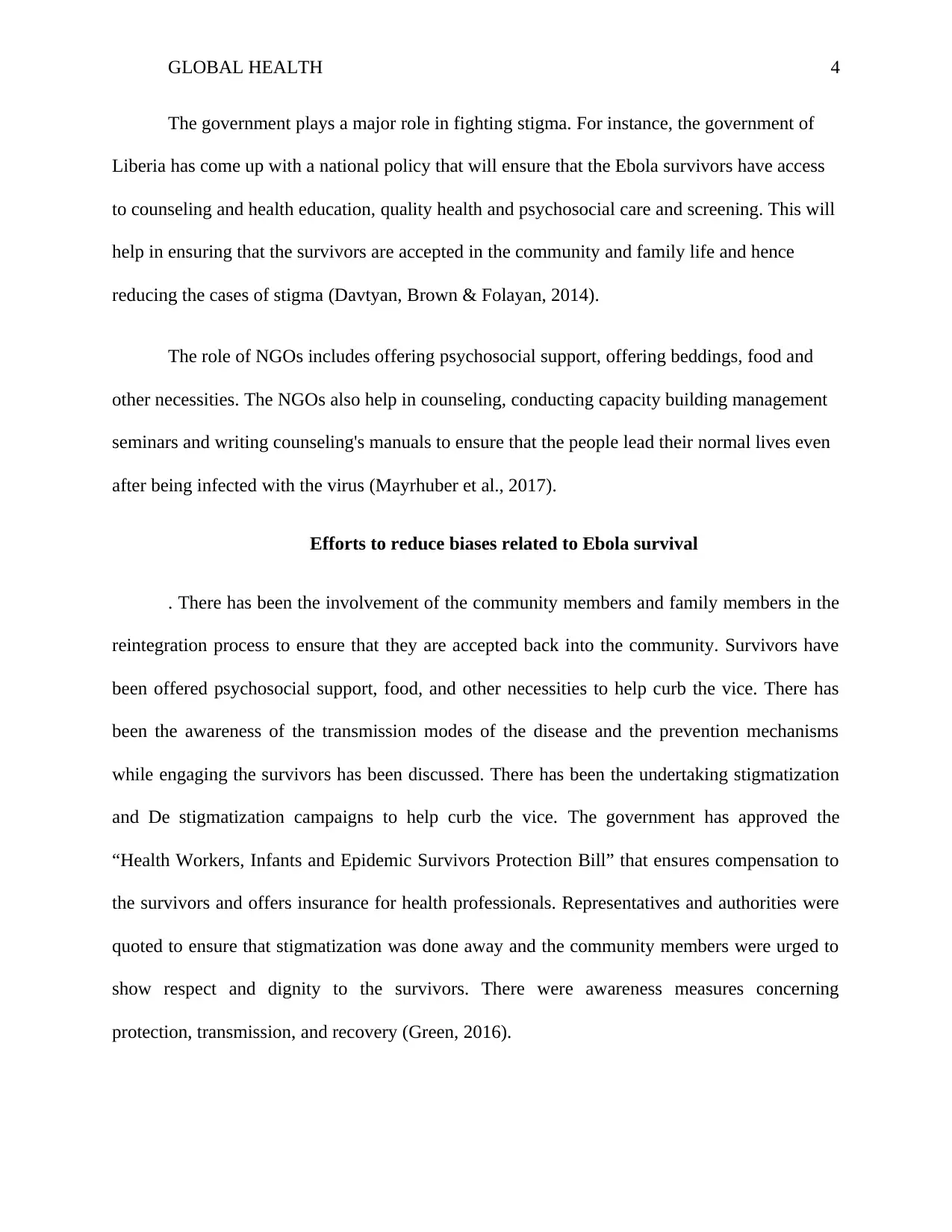
GLOBAL HEALTH 4
The government plays a major role in fighting stigma. For instance, the government of
Liberia has come up with a national policy that will ensure that the Ebola survivors have access
to counseling and health education, quality health and psychosocial care and screening. This will
help in ensuring that the survivors are accepted in the community and family life and hence
reducing the cases of stigma (Davtyan, Brown & Folayan, 2014).
The role of NGOs includes offering psychosocial support, offering beddings, food and
other necessities. The NGOs also help in counseling, conducting capacity building management
seminars and writing counseling's manuals to ensure that the people lead their normal lives even
after being infected with the virus (Mayrhuber et al., 2017).
Efforts to reduce biases related to Ebola survival
. There has been the involvement of the community members and family members in the
reintegration process to ensure that they are accepted back into the community. Survivors have
been offered psychosocial support, food, and other necessities to help curb the vice. There has
been the awareness of the transmission modes of the disease and the prevention mechanisms
while engaging the survivors has been discussed. There has been the undertaking stigmatization
and De stigmatization campaigns to help curb the vice. The government has approved the
“Health Workers, Infants and Epidemic Survivors Protection Bill” that ensures compensation to
the survivors and offers insurance for health professionals. Representatives and authorities were
quoted to ensure that stigmatization was done away and the community members were urged to
show respect and dignity to the survivors. There were awareness measures concerning
protection, transmission, and recovery (Green, 2016).
The government plays a major role in fighting stigma. For instance, the government of
Liberia has come up with a national policy that will ensure that the Ebola survivors have access
to counseling and health education, quality health and psychosocial care and screening. This will
help in ensuring that the survivors are accepted in the community and family life and hence
reducing the cases of stigma (Davtyan, Brown & Folayan, 2014).
The role of NGOs includes offering psychosocial support, offering beddings, food and
other necessities. The NGOs also help in counseling, conducting capacity building management
seminars and writing counseling's manuals to ensure that the people lead their normal lives even
after being infected with the virus (Mayrhuber et al., 2017).
Efforts to reduce biases related to Ebola survival
. There has been the involvement of the community members and family members in the
reintegration process to ensure that they are accepted back into the community. Survivors have
been offered psychosocial support, food, and other necessities to help curb the vice. There has
been the awareness of the transmission modes of the disease and the prevention mechanisms
while engaging the survivors has been discussed. There has been the undertaking stigmatization
and De stigmatization campaigns to help curb the vice. The government has approved the
“Health Workers, Infants and Epidemic Survivors Protection Bill” that ensures compensation to
the survivors and offers insurance for health professionals. Representatives and authorities were
quoted to ensure that stigmatization was done away and the community members were urged to
show respect and dignity to the survivors. There were awareness measures concerning
protection, transmission, and recovery (Green, 2016).
Paraphrase This Document
Need a fresh take? Get an instant paraphrase of this document with our AI Paraphraser
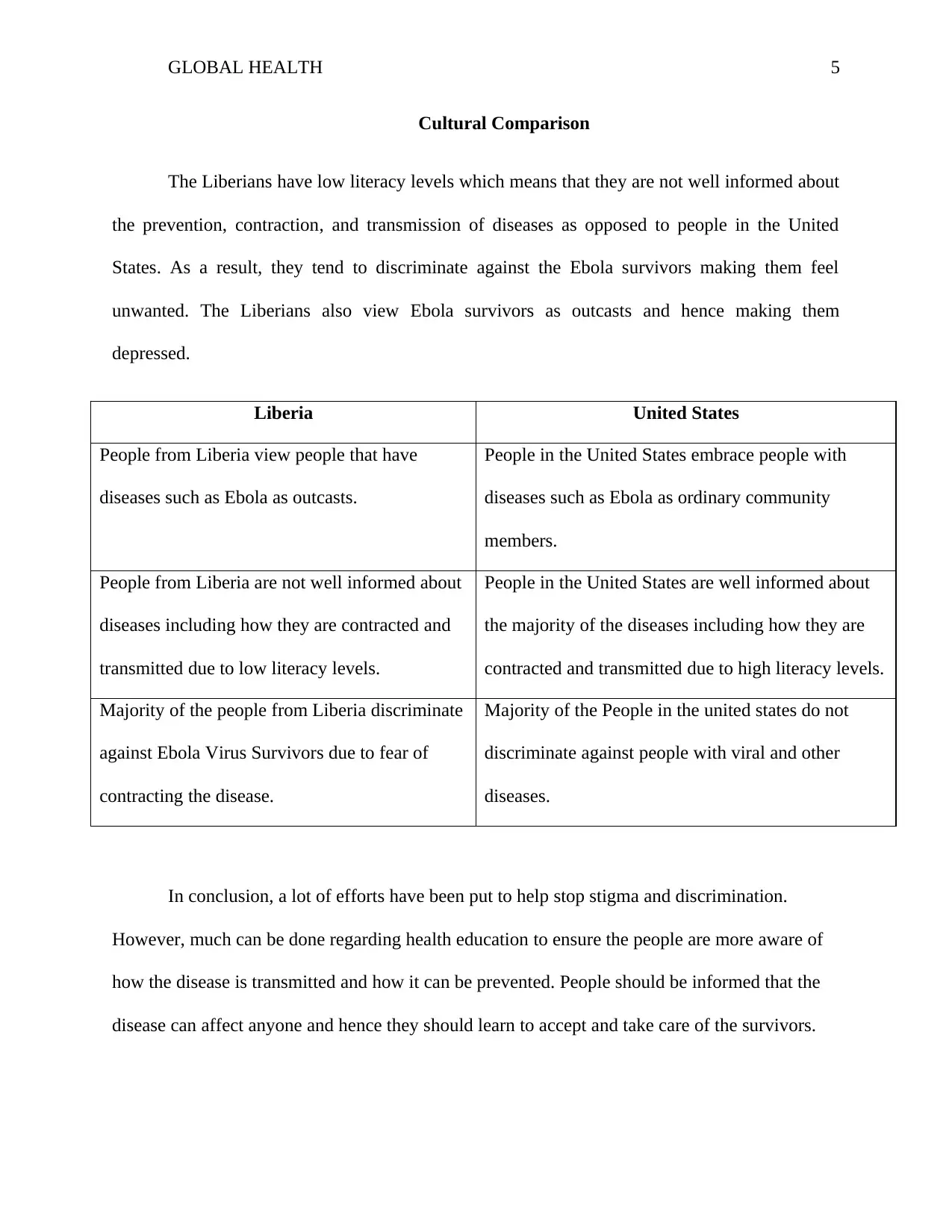
GLOBAL HEALTH 5
Cultural Comparison
The Liberians have low literacy levels which means that they are not well informed about
the prevention, contraction, and transmission of diseases as opposed to people in the United
States. As a result, they tend to discriminate against the Ebola survivors making them feel
unwanted. The Liberians also view Ebola survivors as outcasts and hence making them
depressed.
Liberia United States
People from Liberia view people that have
diseases such as Ebola as outcasts.
People in the United States embrace people with
diseases such as Ebola as ordinary community
members.
People from Liberia are not well informed about
diseases including how they are contracted and
transmitted due to low literacy levels.
People in the United States are well informed about
the majority of the diseases including how they are
contracted and transmitted due to high literacy levels.
Majority of the people from Liberia discriminate
against Ebola Virus Survivors due to fear of
contracting the disease.
Majority of the People in the united states do not
discriminate against people with viral and other
diseases.
In conclusion, a lot of efforts have been put to help stop stigma and discrimination.
However, much can be done regarding health education to ensure the people are more aware of
how the disease is transmitted and how it can be prevented. People should be informed that the
disease can affect anyone and hence they should learn to accept and take care of the survivors.
Cultural Comparison
The Liberians have low literacy levels which means that they are not well informed about
the prevention, contraction, and transmission of diseases as opposed to people in the United
States. As a result, they tend to discriminate against the Ebola survivors making them feel
unwanted. The Liberians also view Ebola survivors as outcasts and hence making them
depressed.
Liberia United States
People from Liberia view people that have
diseases such as Ebola as outcasts.
People in the United States embrace people with
diseases such as Ebola as ordinary community
members.
People from Liberia are not well informed about
diseases including how they are contracted and
transmitted due to low literacy levels.
People in the United States are well informed about
the majority of the diseases including how they are
contracted and transmitted due to high literacy levels.
Majority of the people from Liberia discriminate
against Ebola Virus Survivors due to fear of
contracting the disease.
Majority of the People in the united states do not
discriminate against people with viral and other
diseases.
In conclusion, a lot of efforts have been put to help stop stigma and discrimination.
However, much can be done regarding health education to ensure the people are more aware of
how the disease is transmitted and how it can be prevented. People should be informed that the
disease can affect anyone and hence they should learn to accept and take care of the survivors.
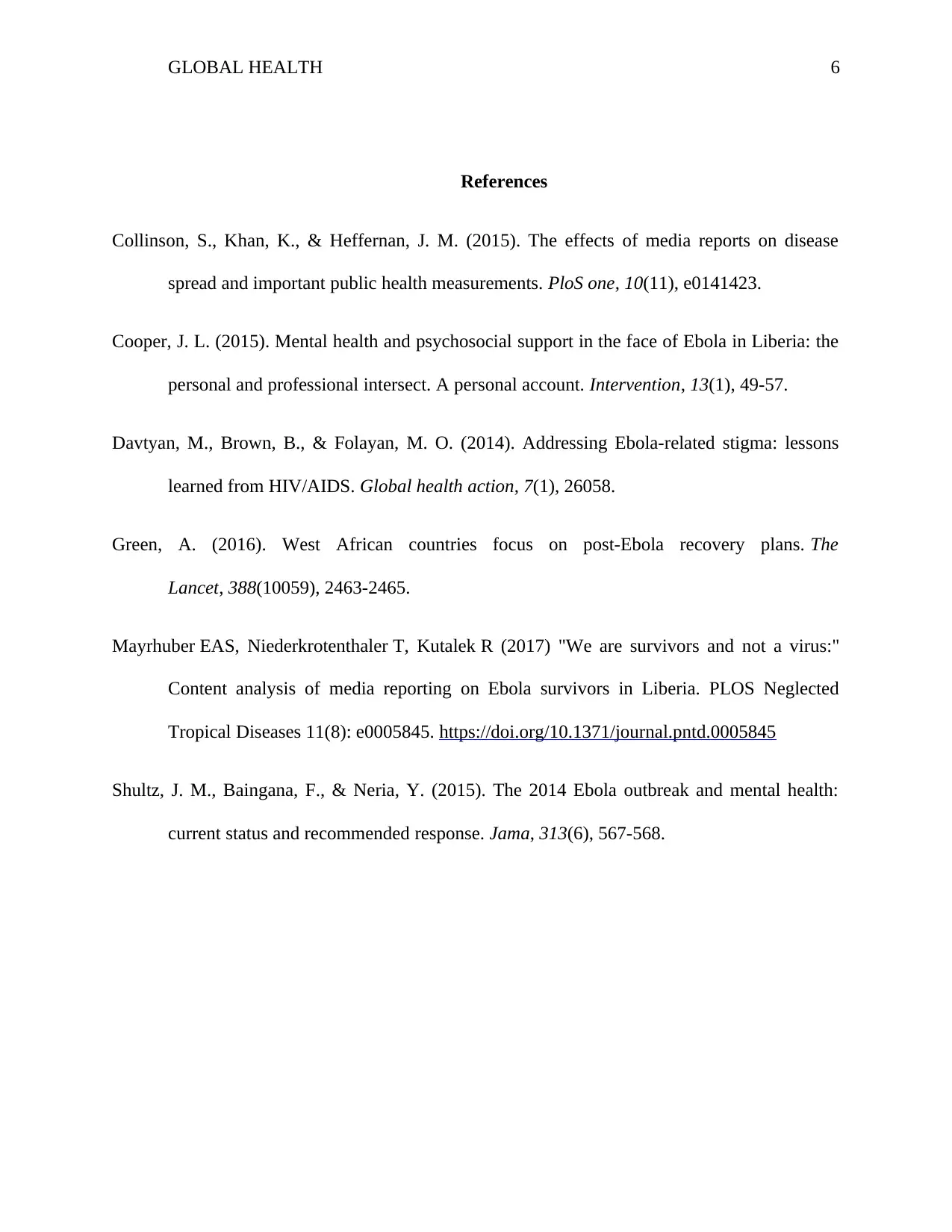
GLOBAL HEALTH 6
References
Collinson, S., Khan, K., & Heffernan, J. M. (2015). The effects of media reports on disease
spread and important public health measurements. PloS one, 10(11), e0141423.
Cooper, J. L. (2015). Mental health and psychosocial support in the face of Ebola in Liberia: the
personal and professional intersect. A personal account. Intervention, 13(1), 49-57.
Davtyan, M., Brown, B., & Folayan, M. O. (2014). Addressing Ebola-related stigma: lessons
learned from HIV/AIDS. Global health action, 7(1), 26058.
Green, A. (2016). West African countries focus on post-Ebola recovery plans. The
Lancet, 388(10059), 2463-2465.
Mayrhuber EAS, Niederkrotenthaler T, Kutalek R (2017) "We are survivors and not a virus:"
Content analysis of media reporting on Ebola survivors in Liberia. PLOS Neglected
Tropical Diseases 11(8): e0005845. https://doi.org/10.1371/journal.pntd.0005845
Shultz, J. M., Baingana, F., & Neria, Y. (2015). The 2014 Ebola outbreak and mental health:
current status and recommended response. Jama, 313(6), 567-568.
References
Collinson, S., Khan, K., & Heffernan, J. M. (2015). The effects of media reports on disease
spread and important public health measurements. PloS one, 10(11), e0141423.
Cooper, J. L. (2015). Mental health and psychosocial support in the face of Ebola in Liberia: the
personal and professional intersect. A personal account. Intervention, 13(1), 49-57.
Davtyan, M., Brown, B., & Folayan, M. O. (2014). Addressing Ebola-related stigma: lessons
learned from HIV/AIDS. Global health action, 7(1), 26058.
Green, A. (2016). West African countries focus on post-Ebola recovery plans. The
Lancet, 388(10059), 2463-2465.
Mayrhuber EAS, Niederkrotenthaler T, Kutalek R (2017) "We are survivors and not a virus:"
Content analysis of media reporting on Ebola survivors in Liberia. PLOS Neglected
Tropical Diseases 11(8): e0005845. https://doi.org/10.1371/journal.pntd.0005845
Shultz, J. M., Baingana, F., & Neria, Y. (2015). The 2014 Ebola outbreak and mental health:
current status and recommended response. Jama, 313(6), 567-568.
⊘ This is a preview!⊘
Do you want full access?
Subscribe today to unlock all pages.

Trusted by 1+ million students worldwide
1 out of 6
Your All-in-One AI-Powered Toolkit for Academic Success.
+13062052269
info@desklib.com
Available 24*7 on WhatsApp / Email
![[object Object]](/_next/static/media/star-bottom.7253800d.svg)
Unlock your academic potential
Copyright © 2020–2026 A2Z Services. All Rights Reserved. Developed and managed by ZUCOL.
